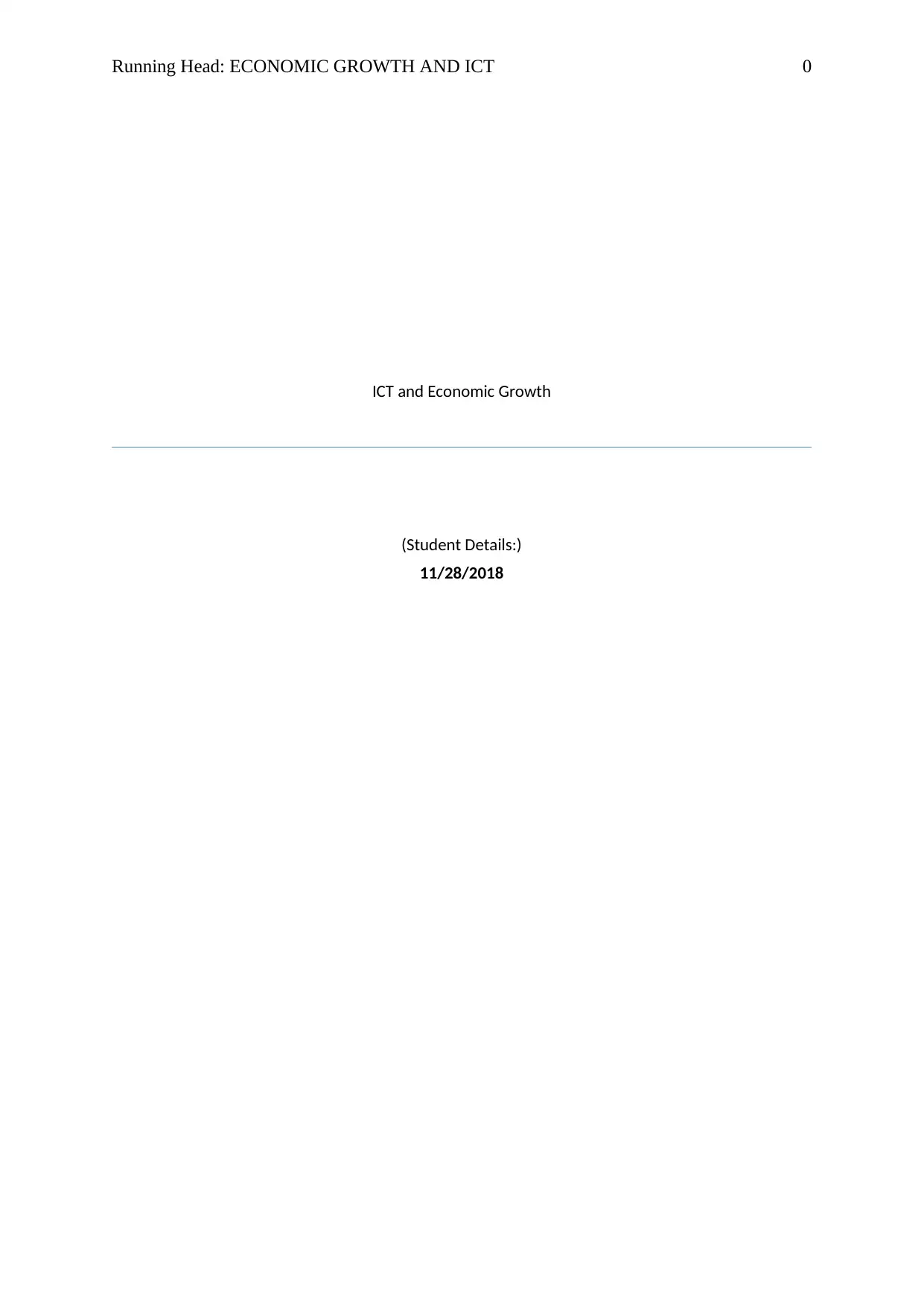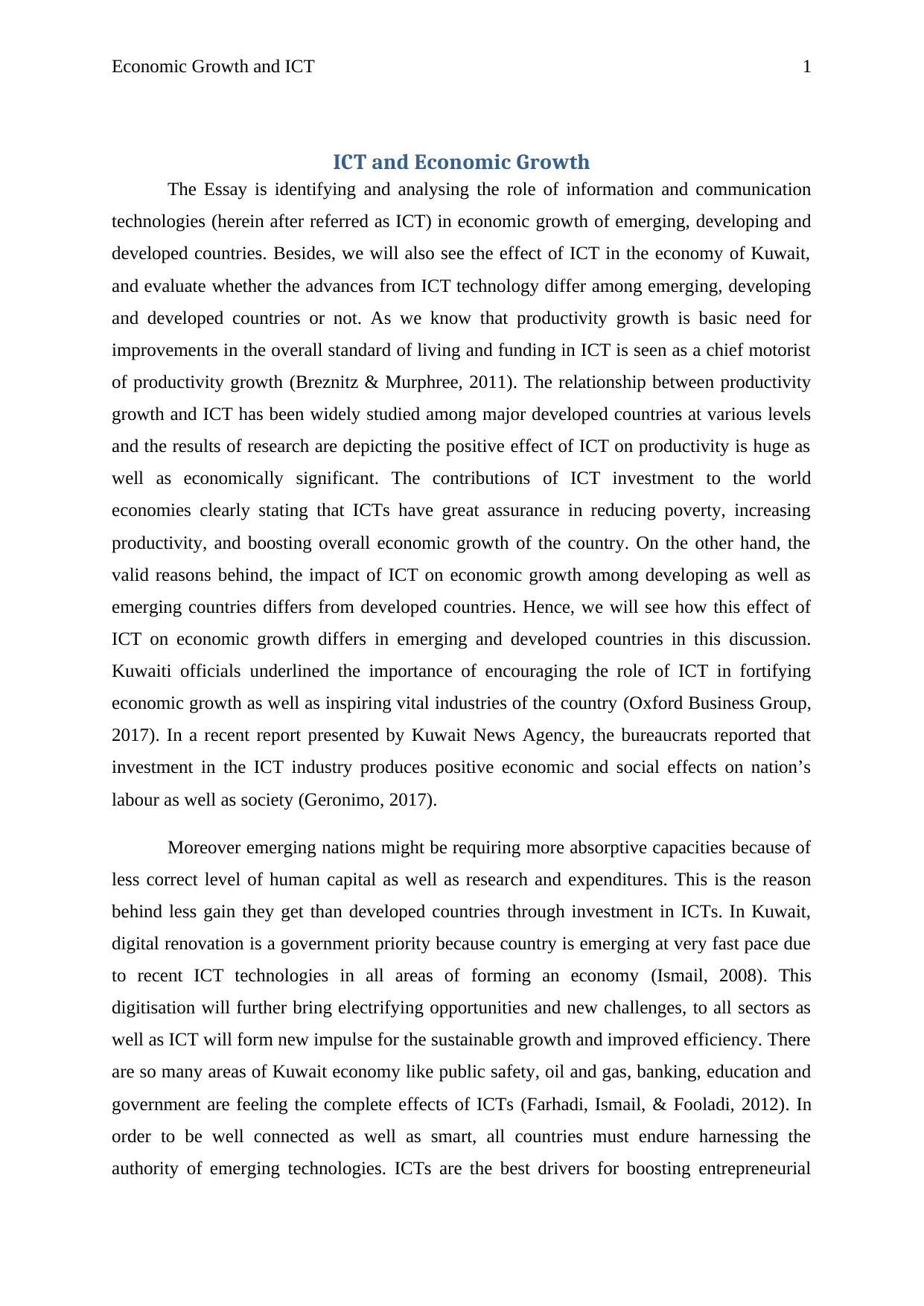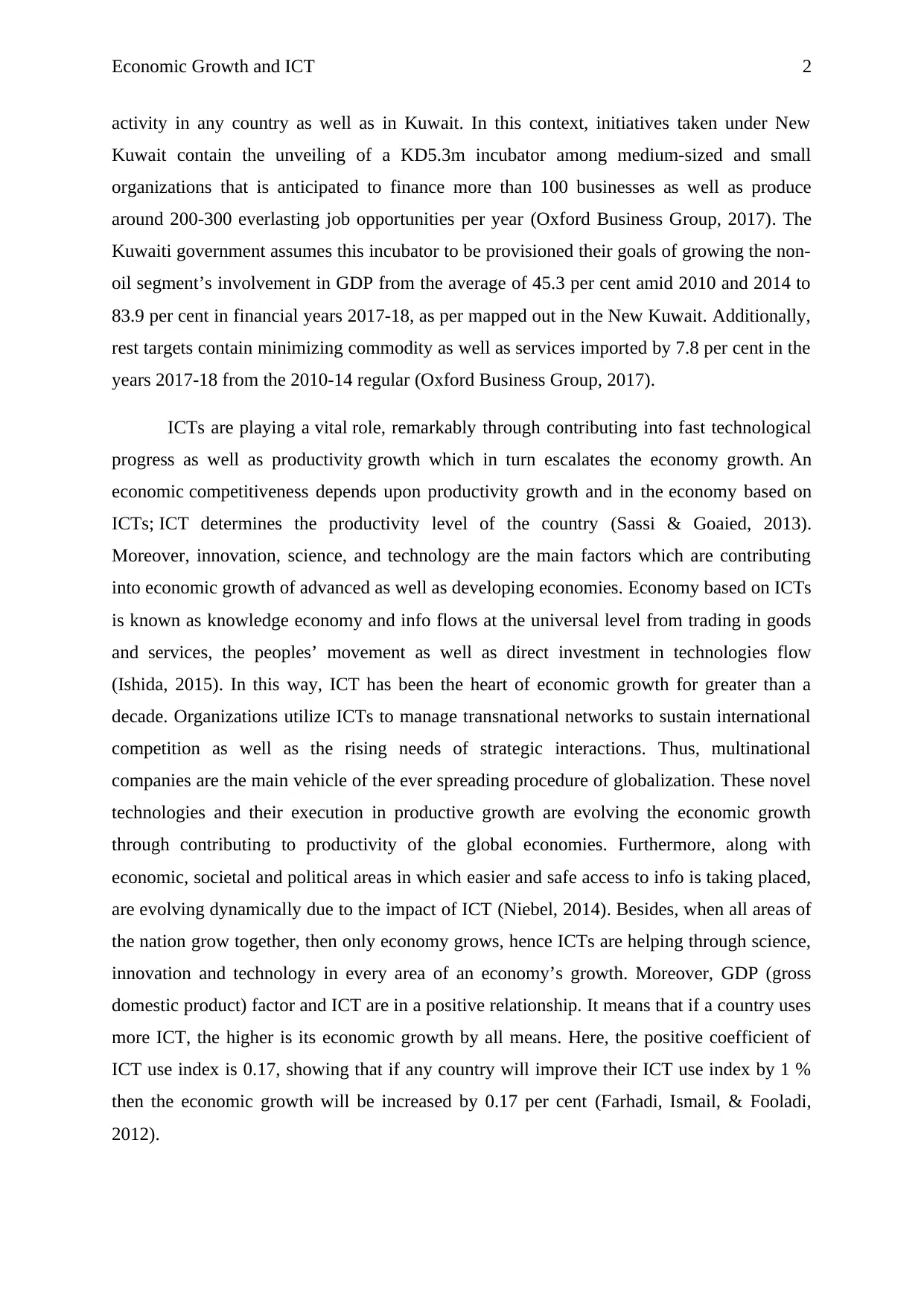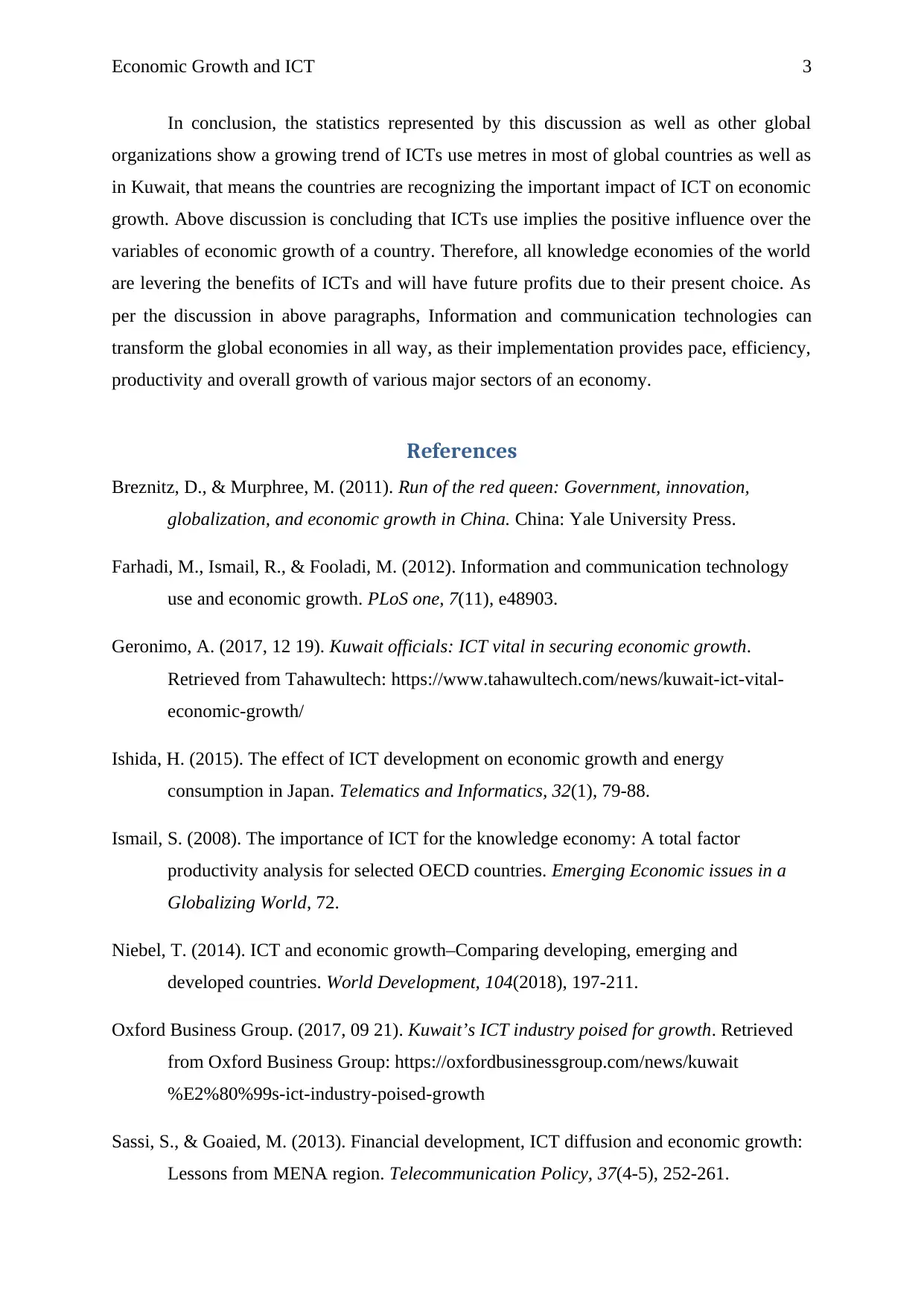DD202A - ICT and Economic Growth: A Comparative Analysis
VerifiedAdded on 2023/05/30
|5
|1422
|412
Essay
AI Summary
This essay explores the role of Information and Communication Technologies (ICT) in fostering economic growth across emerging, developing, and developed countries, with a specific focus on Kuwait's economy. It highlights the positive correlation between ICT investments and productivity growth, noting that while developed countries experience significant gains from ICT adoption, emerging nations may require more absorptive capacities to fully leverage these technologies. The essay emphasizes Kuwait's prioritization of digital renovation and the integration of ICT in various sectors such as public safety, oil and gas, banking, education, and government, further mentioning the role of ICT in boosting entrepreneurial activity and supporting the nation's economic diversification goals. It concludes that ICT plays a crucial role in technological progress, productivity growth, and overall economic development, with a positive relationship between ICT usage and GDP.

Running Head: ECONOMIC GROWTH AND ICT 0
ICT and Economic Growth
(Student Details:)
11/28/2018
ICT and Economic Growth
(Student Details:)
11/28/2018
Paraphrase This Document
Need a fresh take? Get an instant paraphrase of this document with our AI Paraphraser

Economic Growth and ICT 1
ICT and Economic Growth
The Essay is identifying and analysing the role of information and communication
technologies (herein after referred as ICT) in economic growth of emerging, developing and
developed countries. Besides, we will also see the effect of ICT in the economy of Kuwait,
and evaluate whether the advances from ICT technology differ among emerging, developing
and developed countries or not. As we know that productivity growth is basic need for
improvements in the overall standard of living and funding in ICT is seen as a chief motorist
of productivity growth (Breznitz & Murphree, 2011). The relationship between productivity
growth and ICT has been widely studied among major developed countries at various levels
and the results of research are depicting the positive effect of ICT on productivity is huge as
well as economically significant. The contributions of ICT investment to the world
economies clearly stating that ICTs have great assurance in reducing poverty, increasing
productivity, and boosting overall economic growth of the country. On the other hand, the
valid reasons behind, the impact of ICT on economic growth among developing as well as
emerging countries differs from developed countries. Hence, we will see how this effect of
ICT on economic growth differs in emerging and developed countries in this discussion.
Kuwaiti officials underlined the importance of encouraging the role of ICT in fortifying
economic growth as well as inspiring vital industries of the country (Oxford Business Group,
2017). In a recent report presented by Kuwait News Agency, the bureaucrats reported that
investment in the ICT industry produces positive economic and social effects on nation’s
labour as well as society (Geronimo, 2017).
Moreover emerging nations might be requiring more absorptive capacities because of
less correct level of human capital as well as research and expenditures. This is the reason
behind less gain they get than developed countries through investment in ICTs. In Kuwait,
digital renovation is a government priority because country is emerging at very fast pace due
to recent ICT technologies in all areas of forming an economy (Ismail, 2008). This
digitisation will further bring electrifying opportunities and new challenges, to all sectors as
well as ICT will form new impulse for the sustainable growth and improved efficiency. There
are so many areas of Kuwait economy like public safety, oil and gas, banking, education and
government are feeling the complete effects of ICTs (Farhadi, Ismail, & Fooladi, 2012). In
order to be well connected as well as smart, all countries must endure harnessing the
authority of emerging technologies. ICTs are the best drivers for boosting entrepreneurial
ICT and Economic Growth
The Essay is identifying and analysing the role of information and communication
technologies (herein after referred as ICT) in economic growth of emerging, developing and
developed countries. Besides, we will also see the effect of ICT in the economy of Kuwait,
and evaluate whether the advances from ICT technology differ among emerging, developing
and developed countries or not. As we know that productivity growth is basic need for
improvements in the overall standard of living and funding in ICT is seen as a chief motorist
of productivity growth (Breznitz & Murphree, 2011). The relationship between productivity
growth and ICT has been widely studied among major developed countries at various levels
and the results of research are depicting the positive effect of ICT on productivity is huge as
well as economically significant. The contributions of ICT investment to the world
economies clearly stating that ICTs have great assurance in reducing poverty, increasing
productivity, and boosting overall economic growth of the country. On the other hand, the
valid reasons behind, the impact of ICT on economic growth among developing as well as
emerging countries differs from developed countries. Hence, we will see how this effect of
ICT on economic growth differs in emerging and developed countries in this discussion.
Kuwaiti officials underlined the importance of encouraging the role of ICT in fortifying
economic growth as well as inspiring vital industries of the country (Oxford Business Group,
2017). In a recent report presented by Kuwait News Agency, the bureaucrats reported that
investment in the ICT industry produces positive economic and social effects on nation’s
labour as well as society (Geronimo, 2017).
Moreover emerging nations might be requiring more absorptive capacities because of
less correct level of human capital as well as research and expenditures. This is the reason
behind less gain they get than developed countries through investment in ICTs. In Kuwait,
digital renovation is a government priority because country is emerging at very fast pace due
to recent ICT technologies in all areas of forming an economy (Ismail, 2008). This
digitisation will further bring electrifying opportunities and new challenges, to all sectors as
well as ICT will form new impulse for the sustainable growth and improved efficiency. There
are so many areas of Kuwait economy like public safety, oil and gas, banking, education and
government are feeling the complete effects of ICTs (Farhadi, Ismail, & Fooladi, 2012). In
order to be well connected as well as smart, all countries must endure harnessing the
authority of emerging technologies. ICTs are the best drivers for boosting entrepreneurial

Economic Growth and ICT 2
activity in any country as well as in Kuwait. In this context, initiatives taken under New
Kuwait contain the unveiling of a KD5.3m incubator among medium-sized and small
organizations that is anticipated to finance more than 100 businesses as well as produce
around 200-300 everlasting job opportunities per year (Oxford Business Group, 2017). The
Kuwaiti government assumes this incubator to be provisioned their goals of growing the non-
oil segment’s involvement in GDP from the average of 45.3 per cent amid 2010 and 2014 to
83.9 per cent in financial years 2017-18, as per mapped out in the New Kuwait. Additionally,
rest targets contain minimizing commodity as well as services imported by 7.8 per cent in the
years 2017-18 from the 2010-14 regular (Oxford Business Group, 2017).
ICTs are playing a vital role, remarkably through contributing into fast technological
progress as well as productivity growth which in turn escalates the economy growth. An
economic competitiveness depends upon productivity growth and in the economy based on
ICTs; ICT determines the productivity level of the country (Sassi & Goaied, 2013).
Moreover, innovation, science, and technology are the main factors which are contributing
into economic growth of advanced as well as developing economies. Economy based on ICTs
is known as knowledge economy and info flows at the universal level from trading in goods
and services, the peoples’ movement as well as direct investment in technologies flow
(Ishida, 2015). In this way, ICT has been the heart of economic growth for greater than a
decade. Organizations utilize ICTs to manage transnational networks to sustain international
competition as well as the rising needs of strategic interactions. Thus, multinational
companies are the main vehicle of the ever spreading procedure of globalization. These novel
technologies and their execution in productive growth are evolving the economic growth
through contributing to productivity of the global economies. Furthermore, along with
economic, societal and political areas in which easier and safe access to info is taking placed,
are evolving dynamically due to the impact of ICT (Niebel, 2014). Besides, when all areas of
the nation grow together, then only economy grows, hence ICTs are helping through science,
innovation and technology in every area of an economy’s growth. Moreover, GDP (gross
domestic product) factor and ICT are in a positive relationship. It means that if a country uses
more ICT, the higher is its economic growth by all means. Here, the positive coefficient of
ICT use index is 0.17, showing that if any country will improve their ICT use index by 1 %
then the economic growth will be increased by 0.17 per cent (Farhadi, Ismail, & Fooladi,
2012).
activity in any country as well as in Kuwait. In this context, initiatives taken under New
Kuwait contain the unveiling of a KD5.3m incubator among medium-sized and small
organizations that is anticipated to finance more than 100 businesses as well as produce
around 200-300 everlasting job opportunities per year (Oxford Business Group, 2017). The
Kuwaiti government assumes this incubator to be provisioned their goals of growing the non-
oil segment’s involvement in GDP from the average of 45.3 per cent amid 2010 and 2014 to
83.9 per cent in financial years 2017-18, as per mapped out in the New Kuwait. Additionally,
rest targets contain minimizing commodity as well as services imported by 7.8 per cent in the
years 2017-18 from the 2010-14 regular (Oxford Business Group, 2017).
ICTs are playing a vital role, remarkably through contributing into fast technological
progress as well as productivity growth which in turn escalates the economy growth. An
economic competitiveness depends upon productivity growth and in the economy based on
ICTs; ICT determines the productivity level of the country (Sassi & Goaied, 2013).
Moreover, innovation, science, and technology are the main factors which are contributing
into economic growth of advanced as well as developing economies. Economy based on ICTs
is known as knowledge economy and info flows at the universal level from trading in goods
and services, the peoples’ movement as well as direct investment in technologies flow
(Ishida, 2015). In this way, ICT has been the heart of economic growth for greater than a
decade. Organizations utilize ICTs to manage transnational networks to sustain international
competition as well as the rising needs of strategic interactions. Thus, multinational
companies are the main vehicle of the ever spreading procedure of globalization. These novel
technologies and their execution in productive growth are evolving the economic growth
through contributing to productivity of the global economies. Furthermore, along with
economic, societal and political areas in which easier and safe access to info is taking placed,
are evolving dynamically due to the impact of ICT (Niebel, 2014). Besides, when all areas of
the nation grow together, then only economy grows, hence ICTs are helping through science,
innovation and technology in every area of an economy’s growth. Moreover, GDP (gross
domestic product) factor and ICT are in a positive relationship. It means that if a country uses
more ICT, the higher is its economic growth by all means. Here, the positive coefficient of
ICT use index is 0.17, showing that if any country will improve their ICT use index by 1 %
then the economic growth will be increased by 0.17 per cent (Farhadi, Ismail, & Fooladi,
2012).
⊘ This is a preview!⊘
Do you want full access?
Subscribe today to unlock all pages.

Trusted by 1+ million students worldwide

Economic Growth and ICT 3
In conclusion, the statistics represented by this discussion as well as other global
organizations show a growing trend of ICTs use metres in most of global countries as well as
in Kuwait, that means the countries are recognizing the important impact of ICT on economic
growth. Above discussion is concluding that ICTs use implies the positive influence over the
variables of economic growth of a country. Therefore, all knowledge economies of the world
are levering the benefits of ICTs and will have future profits due to their present choice. As
per the discussion in above paragraphs, Information and communication technologies can
transform the global economies in all way, as their implementation provides pace, efficiency,
productivity and overall growth of various major sectors of an economy.
References
Breznitz, D., & Murphree, M. (2011). Run of the red queen: Government, innovation,
globalization, and economic growth in China. China: Yale University Press.
Farhadi, M., Ismail, R., & Fooladi, M. (2012). Information and communication technology
use and economic growth. PLoS one, 7(11), e48903.
Geronimo, A. (2017, 12 19). Kuwait officials: ICT vital in securing economic growth.
Retrieved from Tahawultech: https://www.tahawultech.com/news/kuwait-ict-vital-
economic-growth/
Ishida, H. (2015). The effect of ICT development on economic growth and energy
consumption in Japan. Telematics and Informatics, 32(1), 79-88.
Ismail, S. (2008). The importance of ICT for the knowledge economy: A total factor
productivity analysis for selected OECD countries. Emerging Economic issues in a
Globalizing World, 72.
Niebel, T. (2014). ICT and economic growth–Comparing developing, emerging and
developed countries. World Development, 104(2018), 197-211.
Oxford Business Group. (2017, 09 21). Kuwait’s ICT industry poised for growth. Retrieved
from Oxford Business Group: https://oxfordbusinessgroup.com/news/kuwait
%E2%80%99s-ict-industry-poised-growth
Sassi, S., & Goaied, M. (2013). Financial development, ICT diffusion and economic growth:
Lessons from MENA region. Telecommunication Policy, 37(4-5), 252-261.
In conclusion, the statistics represented by this discussion as well as other global
organizations show a growing trend of ICTs use metres in most of global countries as well as
in Kuwait, that means the countries are recognizing the important impact of ICT on economic
growth. Above discussion is concluding that ICTs use implies the positive influence over the
variables of economic growth of a country. Therefore, all knowledge economies of the world
are levering the benefits of ICTs and will have future profits due to their present choice. As
per the discussion in above paragraphs, Information and communication technologies can
transform the global economies in all way, as their implementation provides pace, efficiency,
productivity and overall growth of various major sectors of an economy.
References
Breznitz, D., & Murphree, M. (2011). Run of the red queen: Government, innovation,
globalization, and economic growth in China. China: Yale University Press.
Farhadi, M., Ismail, R., & Fooladi, M. (2012). Information and communication technology
use and economic growth. PLoS one, 7(11), e48903.
Geronimo, A. (2017, 12 19). Kuwait officials: ICT vital in securing economic growth.
Retrieved from Tahawultech: https://www.tahawultech.com/news/kuwait-ict-vital-
economic-growth/
Ishida, H. (2015). The effect of ICT development on economic growth and energy
consumption in Japan. Telematics and Informatics, 32(1), 79-88.
Ismail, S. (2008). The importance of ICT for the knowledge economy: A total factor
productivity analysis for selected OECD countries. Emerging Economic issues in a
Globalizing World, 72.
Niebel, T. (2014). ICT and economic growth–Comparing developing, emerging and
developed countries. World Development, 104(2018), 197-211.
Oxford Business Group. (2017, 09 21). Kuwait’s ICT industry poised for growth. Retrieved
from Oxford Business Group: https://oxfordbusinessgroup.com/news/kuwait
%E2%80%99s-ict-industry-poised-growth
Sassi, S., & Goaied, M. (2013). Financial development, ICT diffusion and economic growth:
Lessons from MENA region. Telecommunication Policy, 37(4-5), 252-261.
Paraphrase This Document
Need a fresh take? Get an instant paraphrase of this document with our AI Paraphraser

Economic Growth and ICT 4
1 out of 5
Related Documents
Your All-in-One AI-Powered Toolkit for Academic Success.
+13062052269
info@desklib.com
Available 24*7 on WhatsApp / Email
![[object Object]](/_next/static/media/star-bottom.7253800d.svg)
Unlock your academic potential
Copyright © 2020–2026 A2Z Services. All Rights Reserved. Developed and managed by ZUCOL.




